Fun facts about leopard geckos are fascinating and often mysterious to those who keep them as pets or study them in the wild. One curious habit that has piqued the interest of reptile enthusiasts and scientists alike is how these creatures, seemingly leopard geckos lick their lips for no apparent reason. This seemingly simple action raises questions about their communication, feeding habits, and overall well-being. We will delve into the intriguing world of leopard gecko to uncover the reasons behind their lip-licking behavior and gain a deeper understanding of these enigmatic creatures.
The Importance of Lip Licking in Leopard Geckos’ Communication and Survival
Leopard geckos are exciting animals communicating their needs through subtle behaviors, like licking their lips. This action helps them gather information about their environment by collecting scent particles from the air and surrounding surfaces. It allows them to detect prey, assess the presence of other geckos or predators, and determine the temperature and humidity levels.
This behavior is crucial for survival as it helps them navigate their desert habitat and find food. For captive leopard geckos, lip licking shows how they perceive their enclosure and whether any adjustments are needed for their comfort.
Sensing A Mate: The Role of Lip Licking in Leopard Geckos’ Mating Rituals
When a female leopard gecko licks her lips, she releases pheromones that signal her receptiveness to potential mates. This subtle communication allows male geckos to gauge the female’s readiness for mating, making it an essential aspect of their reproductive behavior.
Lip-licking also helps male leopard geckos locate and identify potential mates.
By sensing the pheromones released by females, males can determine which individuals are receptive to breeding. This chemical signaling plays a significant role in the intricate courtship process among leopard geckos, highlighting how these seemingly small behaviors are integral to their reproductive success
Tracking Prey: The Role of Lip Licking in Leopard Geckos’ Hunting Strategy
With their keen hunting abilities, Leopard geckos often exhibit the intriguing behavior of licking their lips. This behavior is not merely a random occurrence but rather a vital aspect of their predator instincts. When stalking prey, leopard geckos use their sense of smell to detect potential meals. As they catch the scent of a potential target, they lick their lips to increase sensory input and gather more information about the surrounding environment.
This lip-licking behavior aids the gecko in tracking prey by allowing them to pick up chemical cues from the air and surroundings. Leopard geckos can effectively assess the location and proximity of potential meals, which enhances their chances of successful hunting.
The Importance of Lip Licking in Leopard Geckos’ Grooming Routine
Licking their lips may seem trivial, but it is vital in the gecko’s grooming routine. By licking their lips, leopard geckos are not only keeping their mouths clean, but they are also spreading saliva across their bodies to remove dirt and maintain hygiene. This self-grooming process helps them to stay healthy and ward off potential infections in the wild.
Lip licking in leopard geckos is also linked to sensory exploration and communication. These reptiles have specialized sensory cells on their lips that help them perceive different textures and temperatures. They can gather essential information about their surroundings and even communicate with other geckos through scent markers left behind by their saliva.
Shedding: How Leopard Geckos Use Lip Licking to Assist in Skin Renewal
Like many other reptiles, Leopard geckos often lick their lips as a part of their shedding process. This behavior is linked to the need for increased moisture during shedding. When a leopard gecko starts its shedding cycle, it becomes dehydrated. Licking their lips helps them reintroduce moisture into their bodies, aiding in the loosening and eventually removing old skin.
Licking their lips also facilitates the softening of the retained shed on areas such as toes and tail tips. By moistening these areas with saliva from lip-licking, the gecko can more effectively shed its old skin without risking injury or restriction in movement. Lip-licking is a practical adaptive mechanism supporting the leopard gecko’s natural shedding process and overall well-being.
It Probably Isn’t Fear: The Real Reason Behind Leopard Geckos’ Lip Licking
Leopard geckos are fascinating animals with many unique behaviors. One of their most exciting behaviors is licking their lips. Some people may think this means they are scared or nervous, but recent research suggests there is more to it. Studies show that leopard geckos lick their lips to sense their environment and gather information about potential food or mates.
Using their tongue to sample the air, they can detect scents and determine if there is any nearby food or potential mates. Lip licking could be a way for geckos to communicate with each other. They leave subtle chemical signals on surfaces with their tongue, which can tell other geckos about their presence or reproductive status.
My Leopard Geckos Lick Their Lips. Should I be Worried?
It’s natural to feel concerned when you notice your leopard gecko repeatedly licking their lips. It’s a common and harmless activity for these captivating creatures. Leopard geckos often lick their lips to clean off any residue or debris, much like how cats groom themselves by licking.
As a reptile owner, it’s crucial to understand that lip-licking does not necessarily indicate stress or illness in leopard geckos.
It’s an instinctual act that serves multiple purposes for their well-being. Suppose you observe other concerning symptoms or behavioral changes along with lip-licking, such as loss of appetite or lethargy. In that case, seeking guidance from a reptile veterinarian is advisable for proper evaluation and peace of mind.
Metabolic Bone Disease: A Common Health Issue in Captive Leopard Geckos
Lip licking is one of their curious behaviors. While it may seem like a simple action, this behavior can be indicative of potential health issues such as Metabolic Bone Disease (MBD). MBD is a common condition in captive leopard geckos, caused by an imbalance of calcium and phosphorus in their diet. When these essential minerals are lacking or not properly absorbed, the gecko’s bone structure becomes weakened, leading to twitching, stiffness, and difficulty moving.
The act of lip licking in leopard geckos can also signal dehydration or stress. Inadequate hydration can lead to serious health complications for these reptiles and negatively impact their overall well-being. Observing this behavior in your pet could serve as a valuable indication that further attention needs to be paid to their environmental conditions and dietary habits.
Mouth Rot: A Common Condition in Reptiles and How to Prevent It in Your Leopard Geck
Mouth rot, or infectious stomatitis, is a common condition among reptiles that affects the mouth and gums, causing inflammation and infection. When leopard geckos repeatedly lick their lips, it may indicate that they are experiencing discomfort or pain in their mouths due to mouth rot.
Regular dental hygiene and proper diet can also help prevent the development of mouth rot in leopard geckos. By staying vigilant and proactive in caring for these unique creatures, owners can ensure the health and well-being of their leopard geckos while enjoying all the fascinating behaviors they exhibit.
Conclusion: Appreciating the Fascinating Behaviors of Leopard Gecko
The behavior of leopard geckos licking their lips serves multiple purposes, including thermoregulation, cleaning, and as a part of their hunting instincts. Through this fascinating behavior, they can maintain their body temperature, keep themselves clean, and prepare for capturing prey. Understanding why leopard geckos lick their lips can provide valuable insights into their natural behaviors and needs in captivity. Responsible pet owners or enthusiasts must observe and appreciate these behaviors while ensuring their living conditions meet their specific requirements.
Happy Leopard Geckos: 8 Best Leopard Gecko Smiles
Leopard geckos are adorable little lizards that can bring joy to anyone’s life. One of the best ways to see them express happiness is through their smile. Here are eight of the best leopard gecko smiles that will put a grin on your face. From the classic “Orange Julius” smile to the goofy “Gummy Bear” grin, these happy leopard geckos are sure to brighten up your day. So, grab a snack, sit back, and enjoy the cutest leopard gecko smiles you’ve ever seen!
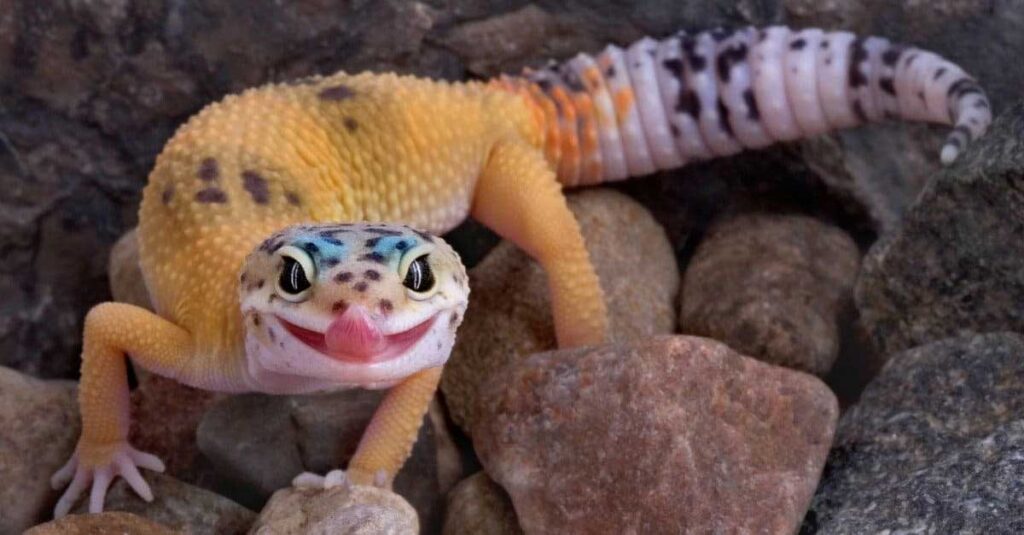
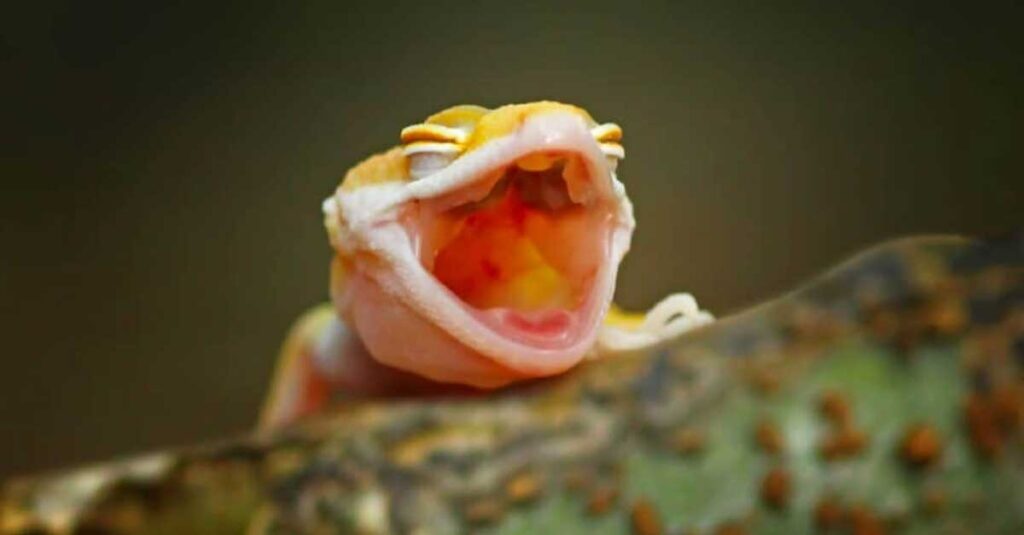
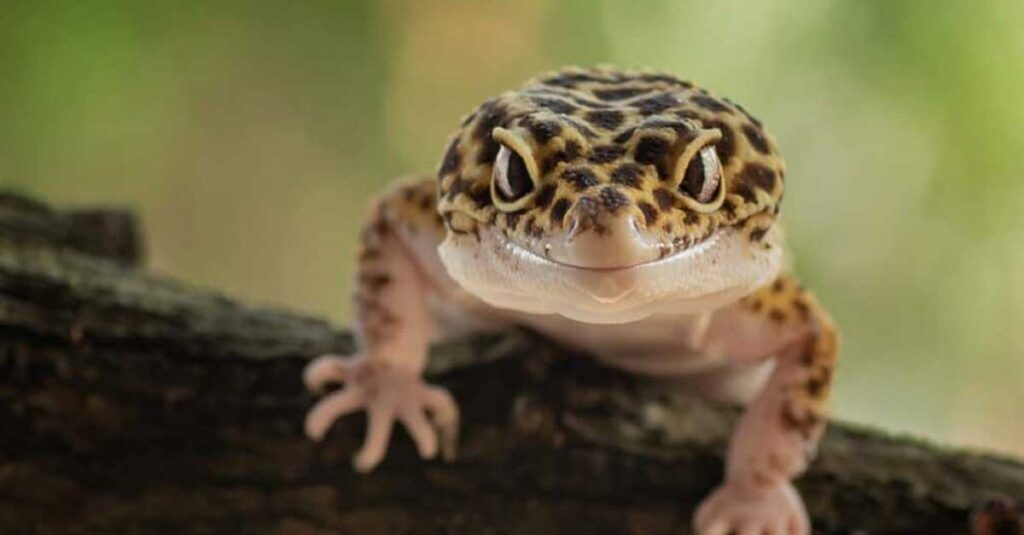
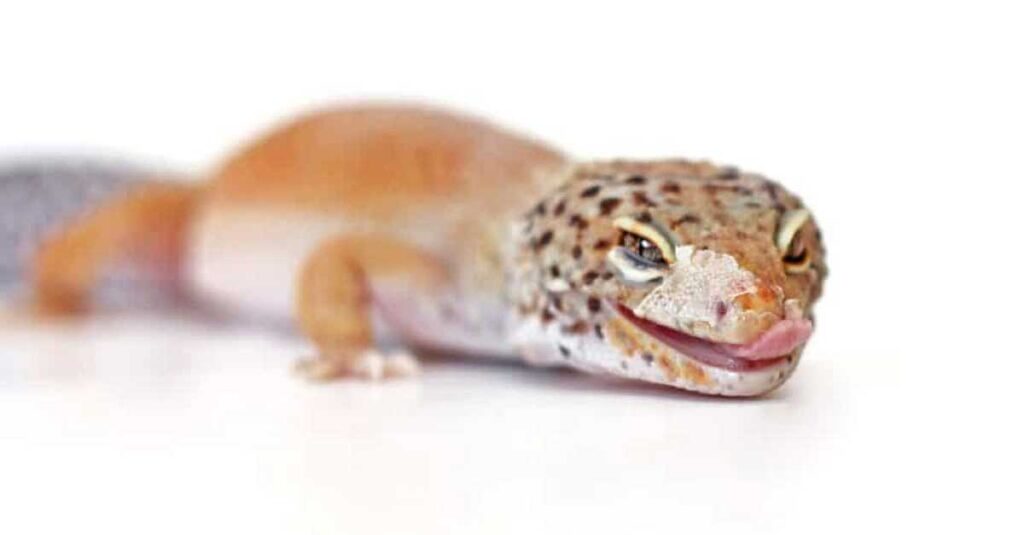
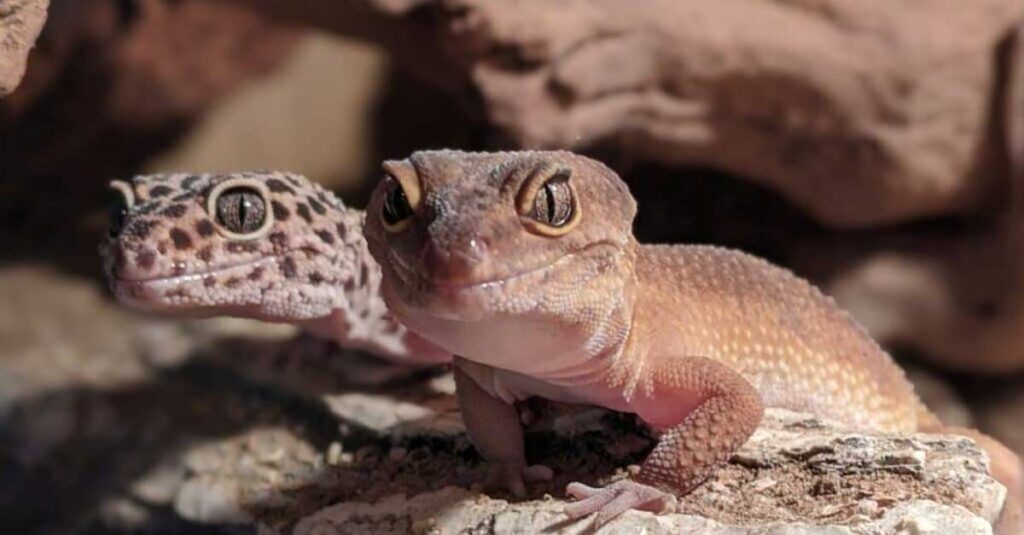
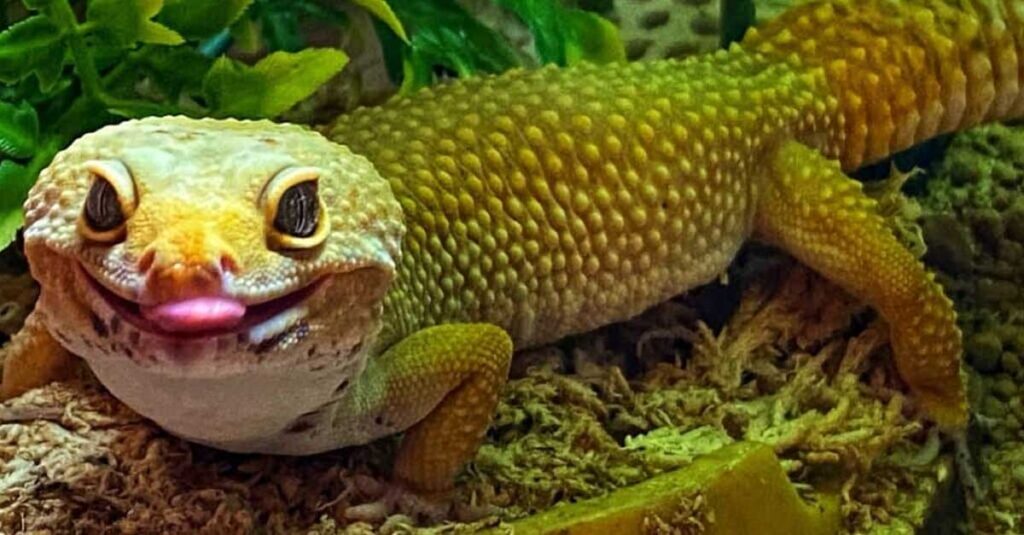
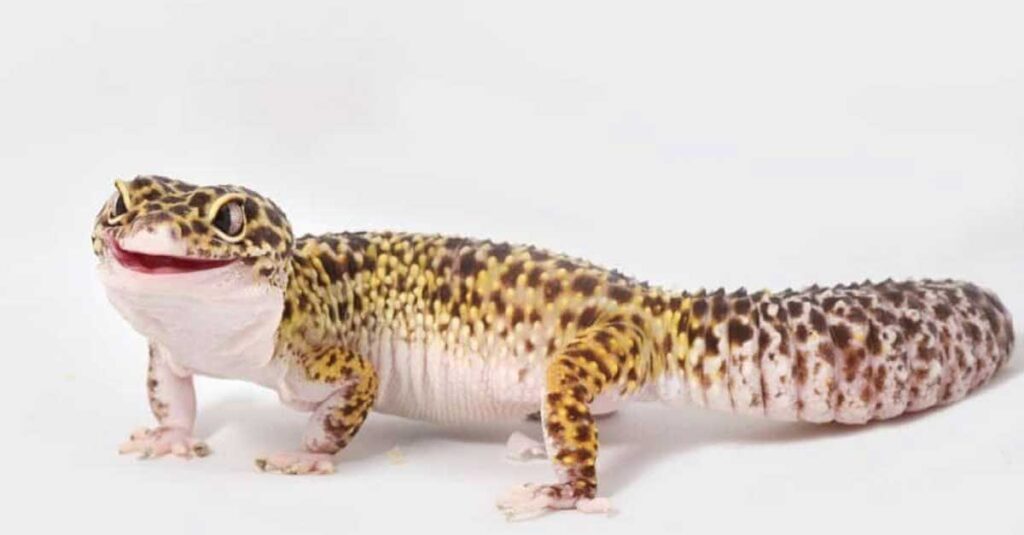
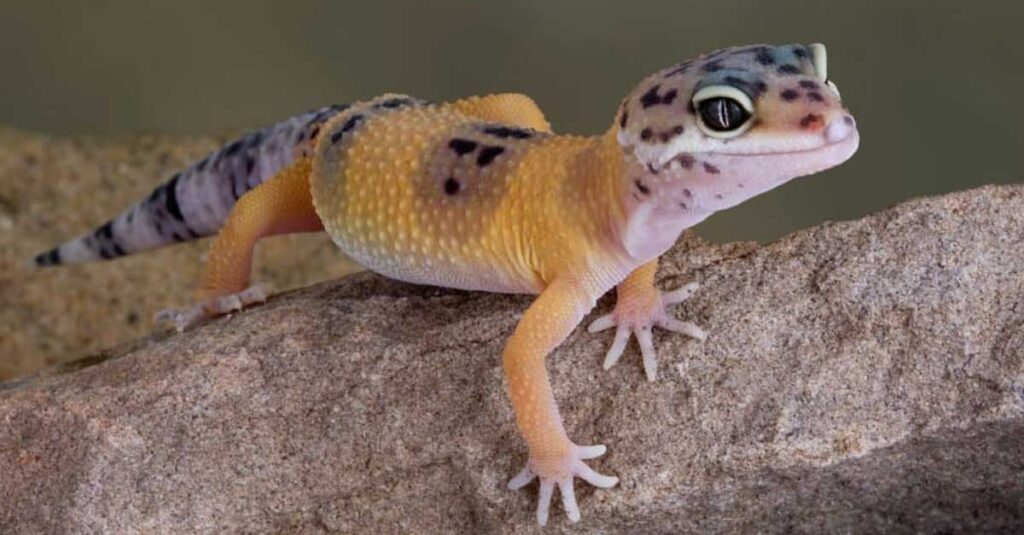
FAQ
What Does a Leopard Gecko Licking Mean?
Leopard geckos lick things to learn about their surroundings. They have particular organs in their tongues to smell something. Licking can also help them communicate with other geckos by leaving scent marks. If a gecko licks a lot, it might be stressed, so watching how they act and their environment is essential.
Why Is My Leopard Gecko Flicking His Tongue?
Leopard geckos use their tongues to learn about their surroundings. They have a particular organ in their mouth that helps them sense smells in the air and on surfaces. When your leopard gecko flicks its tongue, it’s probably trying to gather information about what’s around, like finding food or exploring new scents.
How Do You Know If a Leopard Gecko Loves You?
Leopard geckos don’t feel love like humans do because they’re reptiles. But they can show they feel comfortable and trust their owners. If a leopard gecko is okay with being handled, comes out when you’re around, and doesn’t seem stressed or scared, it feels safe with you. These behaviors show a positive relationship with your leopard gecko, but it’s more about them feeling safe and secure than feeling love like humans.
Why Does My Leopard Gecko Keep Licking His Eyes?
Leopard geckos lick their eyes to keep them clean and moist. This is an instinct to remove debris and foreign particles. Geckos don’t have eyelids, so licking helps keep their eyes hydrated and prevents them from drying out. Watch your gecko’s behavior and get veterinary advice if you notice excessive eye licking or signs of discomfort. A humid hide and proper environmental conditions can also prevent extreme eye-licking in leopard geckos.

